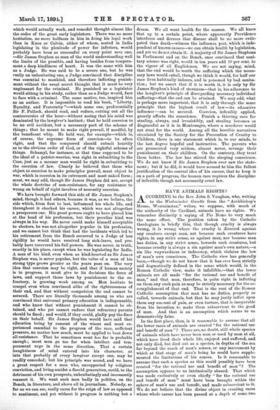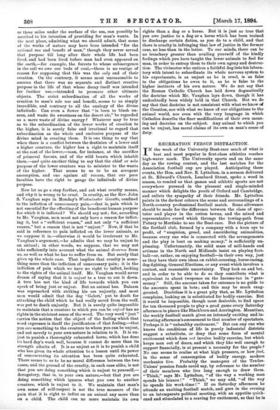HAVE ANIMALS RIGHTS ?
ACCORDING to the Rev. John S. Vaughan, who, writing to the Westminster Gazette from the "Archbishop's House, Westminster," writes, we suppose, with much of the authority of the Cardinal, animals have no rights. We remember distinctly a saying of Pio Nono to very much the same effect. The position taken by the Catholic theologians is briefly this, that though cruelty is always wrong, it is wrong where the cruelty is directed against any creature except man, not because such creatures have rights, in any strict sense, as against man, nor because man has duties, in any strict sense, towards such creatures, but because cruelty is always a sin against man's own nature,—a sin like waywardness or indecency, which violates the law of man's own, conscience. The Catholic view has generally been,—though we do not know that it has ever been strictly and dogmatically defined in the sense which would, in the Roman Catholic view, make it infallible,—that the lower animals are all made "for the rational use and benefit of man," and that man, therefore, is quite right in inflicting on them any such pain as may be strictly necessary for the ac- complishment of that end. That is the root of the Roman Catholic assumption that man has no duties, properly so called, towards animals, but that he may justly inflict upon them any amount of pain, or even torture, that is inseparable from his intention to make them subservient to the good of man. And that is an assumption which seems to us demonstrably false. In the first place, then, is it reasonable to assume that all the lower races of animals are created "for the rational use and benefit of man"? There are, no doubt, still whole species of animals which have never been seen or used by man at all, which have lived their whole life, enjoyed and suffered, and not only died, but died out as a species, in depths of the sea far beyond the reach of man's senses, or any instrument by which at that stage of man's being he could have supple- mented the limitations of his senses. Is it reasonable to assume that such a species as this could possibly have been created "for the rational use and benefit of man "? The assumption appears to us intrinsically absurd. That which was made exclusively or even chiefly " for the rational use and benefit of man" must have been brought within the sphere of man's use and benefit, and made subservient to it. We do not believe that the divine object in creating races whose whole career has been passed at a depth of some two or three miles under the surface of the sea, can possibly be ascribed to his intention of providing for man's wants. In the next place, admitting what we should admit, that some of the works of nature may have been intended "for the rational use and benefit of man," though they never served that purpose till long after their whole life had been lived, and had been lived before man had even appeared on the earth,—for example, the forests to whose submergence in the soil we owe our beds of coal,—there is no vestige of reason for supposing that this was the only end of their creation. On the contrary, it seems most unreasonable to assume that there was no separate and distinct creative purpose in the life of that whose decay itself was intended for further use,—intended to promote other ultimate objects. The strict subordination of all the works of creation to man's sole use and benefit, seems to us simply incredible, and contrary to all the analogy of the divine infinitude. Can even a flower that " is born to blush un- seen, and waste its sweetness on the desert air," be regarded as a mere waste of divine energy ? Whatever may be true as to the subordination of the lower works of creation to the higher, it is surely false and irrational to regard that subordination as the whole and exclusive purpose of the divine mind in creating them. It is one thing to say that when there is a conflict between the destinies of a lower and a higher creature, the higher has a right to maintain itself at the cost of the lower,—man, for instance, at the sacrifice of primeval forests, and of the wild beasts which inhabit them,—and quite another thing to say that the chief or sole purpose of the lower creature was to minister to the wants of the higher. That seems to us to be an arrogant assumption, and one against all reason, that our poor faculties have the right to gauge the infinitude of divine purpose.
Now let us go a step further, and ask what cruelty means, and why it is wrong to be cruel. Is cruelty, as the Rev. John S. Vaughan says in Monday's Westminster Gazette, confined to the infliction of unnecessary pain,—that is, pain which is not essential for the effecting of the beneficent human purpose for which it is inflicted ? We should say not ; for, according to Mr. Vaughan, men must not only have a reason for inflict- ing it, but a "sufficient reason," and not only "a sufficient reason," but a reason that is not " unjust." Now, if that be said in reference to pain inflicted on the lower animals, as we suppose it is,—otherwise it would be irrelevant to Mr. Vaughan's argument,—he admits that we may be unjust to an animal ; in other words, we suppose, that we may not take sufficiently into account what the animal deserves from us, as well as what he has to suffer from us. But surely that gives up the whole case. That implies that cruelty is some- thing more than the infliction of unnecessary pain; it is the infliction of pain which we have no right to inflict, looking to the rights of the animal itself. Mr. Vaughan would never dream of saying that it is unjust to a tree to cut it down. A tree has not the kind of life towards which you can speak of being just or unjust. But an animal has. Balaam was reproached with striking his ass unjustly, and most men would admit that the dog Gelert,' put to death for attacking the child which he had really saved from the wolf, was put to death unjustly. But it is surely quite impossible to maintain that a creature to which you can be unjust has no rights in the strictest sense of the word. The very word " just " carries the notion that the object of the feeling which that word expresses is itself the justification of that feeling,—that you owe something to the creature to whom you can be unjust, and not merely to your own nature in relation to it. It is un- just to punish a thoroughly exhausted horse, which has done its hard day's work well, because it cannot do more than its strength admits of. It is as unjust as it is to punish a child who has given its whole attention to a lesson until its power of concentrating its attention has been quite exhausted. There seems to us to be no moral difference between the two cases, and the ground of the cruelty, in each case alike, is not that you are doing something which is unjust to yourself,— derogatory, that is, to your own nature,—but that you are doing something which ignores what you owe to another creature, which is unjust to it. We maintain that man's own sense of self-respect is not the true measure of the pain that it is right to inflict on an animal any more than on a child. The child can no more maintain its own
rights than a dog or a horse. But it is just as true that you owe justice to a dog or a horse which has been trained to discharge certain duties, as you do to a child, and that there is cruelty in infringing that law of justice in the former case, no less than in the latter. To our minds, there can be no treachery greater than availing yourself of the kindly feelings which you have taught the lower animals to feel for man, in order to entrap them to their own agony and destruc- tion. The vivisector who entices a faithful dog into his labora- tory with intent to subordinate its whole nervous system to his experiments, is as unjust as he is cruel, is as false to the obligations he owes to it, as he is false to the higher instincts of his own nature. We do not say that the Roman Catholic Church has laid down dogmatically the doctrine which Mr. Vaughan lays down, though it has undoubtedly been widely held in that Church. But we do say that that doctrine is not consistent with what we know of the Creation, nor with what we know of our obligations to the animal world, nor even with the very language in which Catholics describe the finer modifications of their own mean- ing and doctrine on the subject. Any animal to which you can be unjust, has moral claims of its own on man's sense of duty.



































 Previous page
Previous page